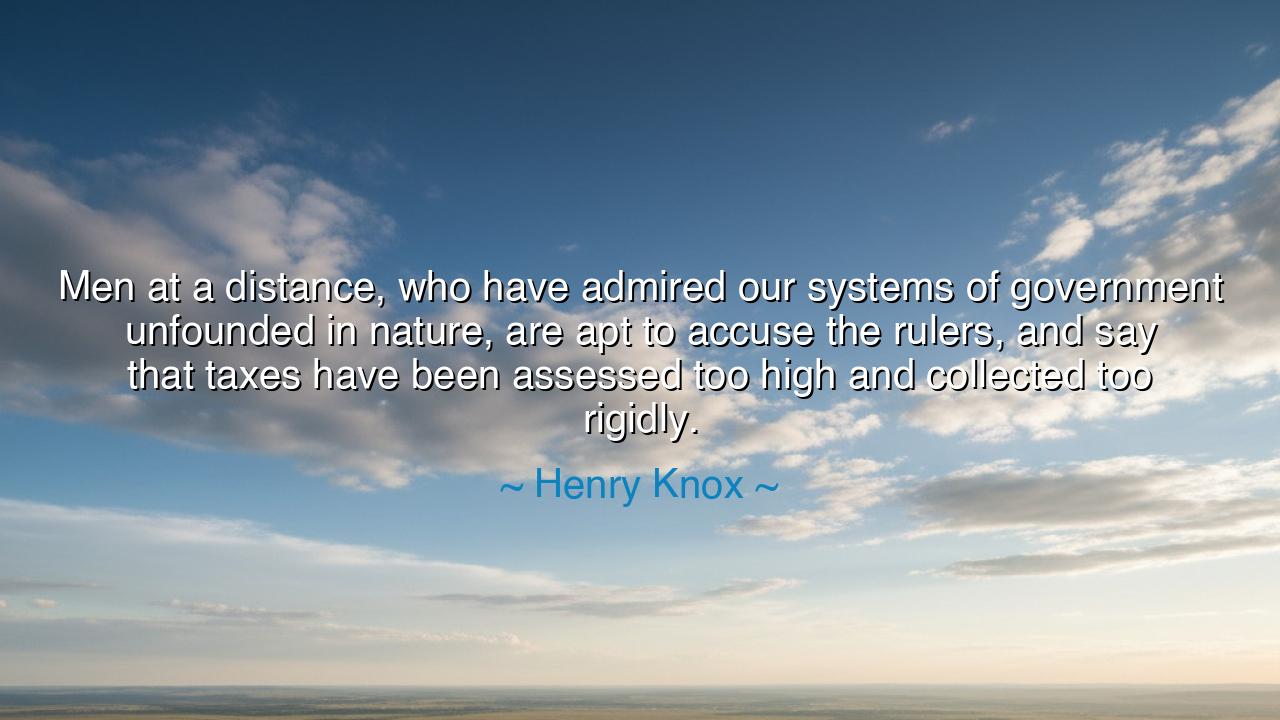
Men at a distance, who have admired our systems of government
Men at a distance, who have admired our systems of government unfounded in nature, are apt to accuse the rulers, and say that taxes have been assessed too high and collected too rigidly.






"Men at a distance, who have admired our systems of government unfounded in nature, are apt to accuse the rulers, and say that taxes have been assessed too high and collected too rigidly." – Henry Knox
In these solemn words, Henry Knox, a soldier of the Revolution and the first Secretary of War under President George Washington, speaks not from theory but from the raw experience of a nation newly born. His words, written during the turbulent years that followed American independence, carry both weariness and wisdom. He saw that while men afar admired the new republic, they did not comprehend the trials that came with sustaining it. To admire liberty from a distance is easy; to preserve it up close, amid debt, hunger, and rebellion, is the true test of a nation’s soul. When Knox wrote that “taxes have been assessed too high and collected too rigidly,” he was speaking of those who judged without understanding—the comfortable critics who blamed leadership while ignoring the burdens of necessity.
The origin of this quote can be traced to the period of unrest following the American Revolution, most notably during Shays’ Rebellion (1786–1787). The new government, drowning in war debt and struggling to maintain stability, imposed taxes to fund the soldiers, repair the economy, and uphold order. But in the countryside, where crops had failed and coin was scarce, these taxes were seen as tyranny reborn. Men who had once fought for freedom now rose in revolt against the very government they had helped to create. Knox, loyal to Washington and to the fragile Union, watched with deep sorrow as rebellion flared among the people he had once led to victory. His words were not condemnation but lament—a plea for understanding. He knew that governance requires sacrifice, and that those far removed from its burdens often see only oppression where there is, in truth, struggle for survival.
At the heart of Knox’s reflection lies a profound truth about human perception and power. Those who stand at a distance, untouched by the weight of leadership, often judge too swiftly. It is a law of human nature that we prefer the dream of government to its reality. To govern, Knox understood, is to balance mercy with necessity, liberty with order. Taxes, to the common eye, appear as instruments of greed; but to the wise, they are the lifeblood of civilization. Without them, armies dissolve, justice falters, and chaos takes root. Yet, Knox also knew the peril of excess—that rulers must never forget the humanity of those they govern. His words capture this eternal tension: between those who rule and those who are ruled, between admiration from afar and understanding from within.
Consider the fate of King Louis XVI of France, who, only a few years after Knox wrote these words, faced the fury of a people crushed by taxes and inequality. The French, inspired in part by the American example, sought liberty but were driven to despair by hunger and mismanagement. There too, men at a distance—philosophers, nobles, and foreign observers—praised the ideals of revolution, even as blood soaked the streets of Paris. Knox’s warning might well have been written for that moment: admiration without comprehension breeds chaos. Governments, however imperfect, must navigate realities that ideals alone cannot sustain. When the governed lose sight of the necessity of order, and when rulers forget compassion, nations fall into ruin.
Knox’s statement also speaks to a broader principle—the fragility of new systems. Every form of government, he reminds us, must stand not only on theory but on human virtue. A republic, especially, demands understanding and patience from its citizens. The taxes he spoke of were not signs of tyranny but the price of independence. Yet the people’s anger, stoked by distance and miscommunication, turned admiration into resentment. In this, Knox discerned a danger that threatens all free nations: the gap between the governed and the governors, between those who endure hardship and those who assign blame. His insight was prophetic, for this same chasm continues to divide societies across centuries.
To hear Knox’s voice is to hear the cry of one who knew both the sword and the pen, both battle and burden. He saw that freedom is not self-sustaining; it demands constant tending by those willing to bear the ungrateful weight of responsibility. His lament for the misunderstood rulers of his day echoes through time as a warning to all who judge without laboring, who criticize without comprehending. The true statesman, he suggests, must stand firm even when condemned, for leadership is not a pursuit of applause but a service to endurance.
The lesson of Henry Knox’s words is eternal: do not mistake the difficulty of governance for its corruption. Those who lead must strive for justice tempered by mercy; those who follow must temper judgment with understanding. A nation’s strength lies in the humility of both. Let us remember that distance distorts truth, and that the burdens of freedom are not light. When next we are tempted to accuse our rulers too quickly, let us recall that they, too, are human—struggling to hold together the delicate threads of order, justice, and peace.
For as Knox teaches, to preserve a republic is far harder than to found one. Admiration is easy; stewardship is sacred. The wise citizen must see beyond distance, beyond rumor, and beyond resentment—to understand that every tax, every law, and every burden of governance carries within it the silent labor of those who strive to hold civilization together.






AAdministratorAdministrator
Welcome, honored guests. Please leave a comment, we will respond soon